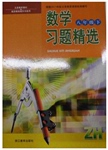题目内容
I used to love science class—all of them— 86. _______
biology, chemistry, geography, physics.I think I 87. _______
liked those classes because I felt that it helped me 88. _______
understand what the world works. For example, when 89. _______
I was a child, the rain was a mystery(奥秘).In one 90. _______
class, I learned it rained. I think science classes 91. _______
clear up mysteries. But then there is always more 92. _______
mysteries look into. What was my least favourite class? 93. _______
That was math. After learn the basics of the subject, 94. _______
nothing else seemed very practically to me. I never 95. _______
saw how I could use it in my daily life.
86.class→classes
87.√
88.it→they
89.what→how
90.去掉the
91. Learned后加why
92.is→are
93.look前加to
94.learn改为learning
95. Practically改为practical
解析:
86.class→classes此题考查名词的数。根据all of them可以确定class要用复数形式。
87.√
88.it→they此题考查代词的用法。they指代classes。
89.what→how此题考查从句的连接词的用法。what在宾语从句中作宾语,而这个句子中的谓语动词works是一个不及物动词,后面不接宾语。
90.去掉rain前的定冠词the此题考查冠词的基本用法。rain在这里是泛指。
91. 在learned和it rained之间加why此题考查从句的连接词的用法。这句话的意思是“我知道了为什么下雨”。
92.is→are此题考查主谓一致。这是一个存在句,在下行中的mysteries可知,要用系动词are。
93.在mysteries和look into中间加to此题考查动词不定式的用法。to look into作mysteries的定语。
94.Learn改为learning此题考查非谓语动词。在介词后要用动名词作宾语。
95.Practically改为practical此题考查形容词的用法。seemed是系动词,后接形容词作表语。

 习题精选系列答案
习题精选系列答案Every country has its own culture.
Even though each country uses doors, doors may have 50 functions and purposes which lead to 51 differences.
When I first came to America, I noticed that a public building had two different 52 and they had distinct functions. You have to push the door with the word “ PUSH ” to go out of the building and to pull the door with the word “PULL” to 53 the building. This was new to me, because we use the 54 door in South Korea. For quite a few times I failed to go out of a shopping centre and was embarrassed.
The way of using school bus doors was also 55 to me. I used to take the school bus to school. The school decided that when the driver opened both the front and back door. Students who were getting off the bus should get off first, and students who were getting on should get on 56 in South Korea. We do not need to wait for people to 57 . One morning I hurried to the bus, and when the bus doors opened, I 58 tried to get on the school bus through the front door. All the students around looked at me. I was totally 59 , and my face went red.
|
1. |
|
|
2. |
|
|
3. |
|
|
4. |
|
|
5. |
|
|
6. |
|
|
7. |
|
|
8. |
|
|
9. |
|
|
10. |
|